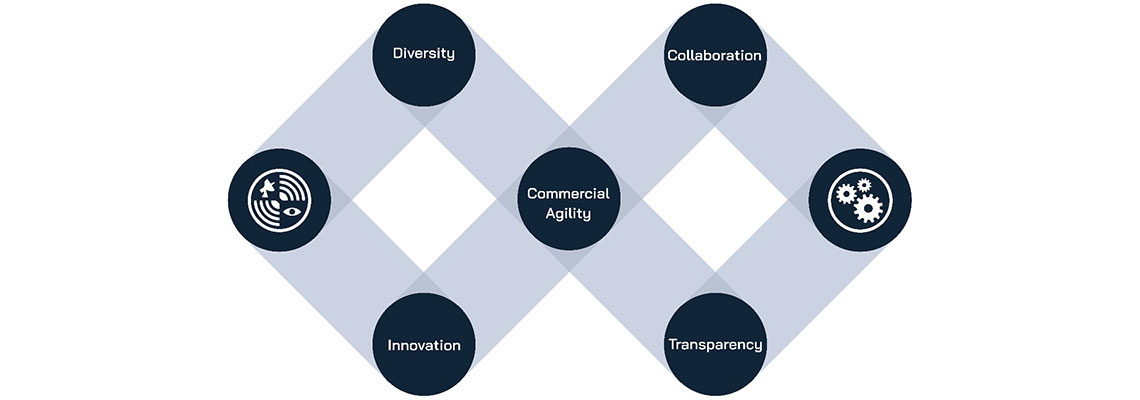The SERAPIS Framework Agreement has been created to enable Dstl to influence and gain access to the most diverse expertise and talent available across the industrial supplier base, particularly in relation to:
- Small and Medium Enterprise (SME) companies*
- Non-Traditional Defence Suppliers (NTDS)
- Academia
The aim is to develop new and battle winning capabilities within C4ISR, Space Systems, Synthetic Environment and Simulation technologies, and to see them brought through to operational use in a timely and efficient manner.
The Framework Agreement is split into 6 capability areas or ‘lots’:

What is SERAPIS?
The SERAPIS Framework Agreement has been designed to accommodate and build upon the success of previous framework agreements while increasing commercial agility, diversity, transparency and collaboration.
It aims to reach non-traditional defence suppliers, small and medium-sized enterprises and academia, as well as traditional defence suppliers, in order to develop new capabilities for the UK’s defence and security.
With the core objective being to develop new battle winning capabilities within C4ISR, Space Systems, Synthetic Environment and Simulation technologies, and to see them brought through to operational use in a timely and efficient manner.
Capability Areas
The Framework Agreement is split into 6 capability areas or ‘Lots’ managed by Prime Contractors as detailed below:
- Lot 1 Covers the development and integration of new and emerging ISTAR ‘Collect’ technology and techniques into the wider defence and cross-government ISTAR enterprise. Includes a broad range of conventional and novel sensing technology (incl. gravity and biometric sensing) but also Open Source (OSINT) and HUMINT data and information collection capabilities.
Lead: Roke Manor - roke-serapis-lot1@roke.co.uk - Lot 2 Covers all aspects of Defence & Security (D&S) space systems from underpinning enabling services such as space-specific analysis; fundamental and applied space research for areas such as the space environment; design and manufacture of space equipment and subsystems; space launch & range; through-life operation of satellites (including ground station), or terrestrial-based space systems like those used for the surveillance of space; through to the application of space systems for defence and security exploitation/benefit.
Lead: BAE Systems Applied Intelligence - SERAPIS@baesystems.com - Lot 3 Covers the development, testing, and evaluation of novel command and control (C2) systems to improve decision making, including the human and autonomous (machine) system elements. Includes the development of novel agile, adaptive and resilient C2 concepts for operation in constrained, degraded, or denied environments.
Lead: QinetiQ - serapislot3@qinetiq.com - Lot 4 Covers the development of C4ISR Communications and Networks. Will exploit and drive emerging concepts and technology in military and civilian communications infrastructure and include the development of policy, technology and architectural options for the provision of assured information, Information Management and Exploitation (IM/IX).
Lead: QinetiQ - serapislot4@qinetiq.com - Lot 5 Covers the development of Synthetic Environments, Modelling and Simulation, associated tools and assessment processes to allow defence to train, exercise and prepare for operations, and to test, evaluate and assess the performance of military capabilities and the C4ISR enterprise, as well as to enhance and sustain capability to exploit of SSEs across all Defence applications.
Lead: NSC - SERAPIS_SSE@nsc.co.uk - Lot 6 Covers the development of Data Analytics and Information Processing tools and techniques in support of Defence’s Decision Making processes and techniques (covered in Lot 3). Includes the development and application of Autonomy, Artificial Intelligence and Machine Learning, information and visualisation and Man-Machine Interface development.
Lead: Frazer-Nash - serapis@fnc.co.uk
Dstl SERAPIS Framework Agreement Team, Dstl - DSTLSERAPIS@dstl.gov.uk
* Ministry of Defence SME Action Plan (2019-2022) targets to increase in spend with SMEs to 25% by 2022.

